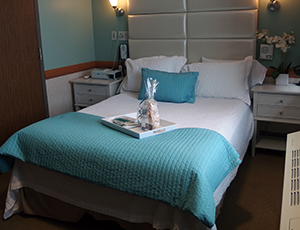Sleep Disorders
Sleep is a basic necessity. When you have a good night’s sleep, you feel refreshed, alert and ready to face the day. When you don't, every aspect of your life, including your health, can suffer.
Although sleep disorders are quite common, they are also very treatable. In fact, most patients with sleep disorders get better with proper diagnosis and treatment.
The Sleep Center at Watertown Regional Medical Center offers comprehensive services for diagnosing and treating the full spectrum of sleep disorders. Our exceptional team includes board-certified physicians with specialty training in Sleep Medicine and experienced support staff.
Conditions treated at the Sleep Center include:
• Obstructive Sleep Apnea (OSA)
• Shift Work Disorder (SWD)
• Sleep-Related Eating Disorders
• Restless Legs Syndrome (RLS)
• Insomnia
• Adolescent sleep disorders
• Narcolepsy
If you think you might have sleep apnea or any other sleep disorder, talk to your primary care provider about a sleep study. Sleep studies are conducted in our newly renovated, state-of-the-art Sleep Center. The rooms offer a home-like environment with Sleep Number beds, a private bathroom, oversized pillows, wifi and cable. Fans are even available by request to ensure a restful night’s sleep.
If you are suffering from a sleep disorder or would like additional information, please call 920-262-4335.
Not sure if you have a sleep disorder? The Epworth Sleepiness Scale measures your general level of sleepiness. Your score can help you start a conversation with your doctor about excessive sleepiness. Download the Epworth Sleepiness Scale to take the assessment.
What is Obstructive Sleep Apnea (OSA)?
Obstructive Sleep Apnea is a common condition, yet many people don’t know they have it. According to the American Association for Respiratory Care, about 10 million Americans have undiagnosed sleep apnea. Symptoms are often ignored or minimized even as they grow progressively worse. If any of these symptoms sound familiar, talk to your primary care provider:
• You or your bed partner snores loudly and heavily and feels sleepy during the day.
• You notice that your bed partner stops breathing, gasps, or chokes during sleep.
• You sometimes fall asleep at inappropriate times, such as while you are talking or eating.
Sleep apnea happens when the upper airway partially or completely collapses during sleep, causing you to stop breathing, or have very shallow breathing, while you sleep. The pause in breathing can last for seconds or minutes and may occur 30 or more times in an hour. This means the brain—and the rest of the body—may not get enough oxygen.
What problems can OSA cause?
Symptoms of OSA are often ignored or minimized, even as they grow progressively worse. But untreated sleep apnea can lead to many problems, some of them serious. In addition to fatigue, irritability, and memory problems, sleep apnea has been linked to headaches, depression, weight gain, high blood pressure, and heart problems. People with sleep apnea are at higher risk for car crashes and workplace accidents, as well as heart attack and stroke.
If you or your bed partner has symptoms of sleep apnea or would like additional information, please call 920-262-4335.